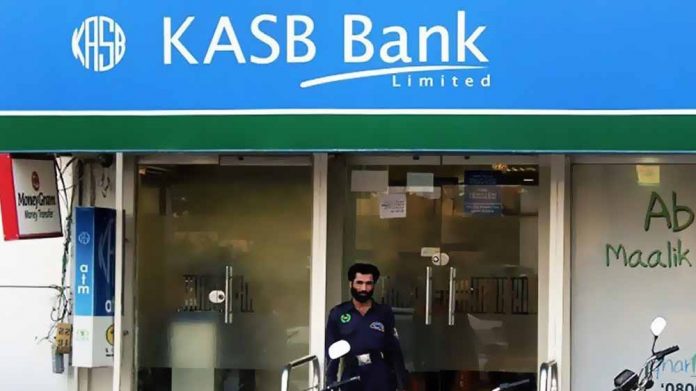KARACHI: The valuation of erstwhile KASB Bank conducted by audit firm AF Ferguson & Company deprived the bank’s shareholders of their rights as “major changes in assumptions” following the issue of the report “altered entire dynamics of the valuation”, according to KASB Corporation.
State Bank of Pakistan (SBP) used its regulatory powers under Section 47 of the Banking Companies Ordinance 1962 to merge KASB Bank with and into BankIslami Pakistan Ltd (BIPL) in May 2015 at a token price of Rs1,000 on the basis of the valuation conducted by the audit firm.
KASB Corporation, a shareholder of erstwhile KASB Bank, submitted its objections to the SBP on May 28 in line with an order of the Sindh High Court (SHC) that it passed earlier this month.
The amalgamation scheme overseen by the SBP relied heavily on the valuation report by AF Ferguson & Company. “One of the fundamental assumptions of the valuation, capital injection of Rs16 billion in May 2015, did not occur, which makes the entire exercise of amalgamation considering the negative valuation of KASB Bank a dubious one,” KASB Corporation said in its objections report submitted to the SBP.
The audit firm conducted the valuation in two parts. One, it conducted a valuation of the core banking business of the bank, excluding investments in subsidiaries and associates and investment in Evolvence Capital Ltd. Two, it conducted the valuation of bank’s investments.
AF Ferguson & Company arrived at a negative valuation of the core banking business of erstwhile KASB Bank. According to KASB Corporation, the biggest lacuna in the valuation was its assumption of immediate capital injection amounting to Rs16 billion (having a present value of negative Rs14.6 billion).
“This single assumption turned the positive valuation of the core banking business into negative. Subsequently, no such capital injection was made,” it said, noting that BIPL was instead provided with a “lucrative incentive” in the shape of financing facilities of Rs20 billion at almost negligible rates, including term financing for 10 years at 0.01 per cent per annum.
“This changed the entire assumptions on the basis of which AF Ferguson & Company had done its valuation,” it said.
The objections report notes that the valuation would have been positive if the SBP had informed the audit firm and other market players about the incentive. Also, the shareholders would have been able to get better prices for the share in the assets of the bank due to the better interest generated among other market players that were interested in acquiring a stake.
KASB Corporation also observed that the valuation does not reflect whether the chartered accountancy firm considered “alternate approaches” when its assessment of the core banking business using the discounted cash flow (DCF) method — a technique used to estimate the attractiveness of an investment opportunity — and market approaches resulted in a negative value.
This appeared to contradict the scope of services written in the tripartite agreement. The agreement mandated that the audit firm would also evaluate the use of market approach for the valuation of the core business for cross-checking the value arrived at by using the DCF methodology.
“This was the major lapse of AF Ferguson & Company that needs clarification as this resulted into a material error in the valuation of the bank,” KASB Corporation said.
It added that KASB Securities Ltd, one of the core assets of the bank, was not properly valued in the valuation report. Contrary to the tripartite agreement that held that AF Ferguson & Company would use the DCF methodology as well as market approach for the valuation of KASB Securities, the firm did not use the market approach. “This was also a result of malafide in the valuation report that needs clarification as this resulted into material error in the valuation of the bank,” it said.
Similarly, KASB Bank held 40.2 per cent stakes in Shakarganj Food Products Ltd (SFPL). KASB Corporation claims that “malafide was apparent even before the start of the valuation exercise” when, citing a paucity of time as well as the cost of assignment considerations, it was inked out in the agreement that the engaged firm would only perform an indicative valuation of the bank’s investment in SFPL.
“While reviewing their valuation report, it is shocking to note that even that indicative valuation has not been done on flimsy grounds,” it said.
KASB Corporation called it ‘unreasonable’ that the valuation report recommended a further provisioning of Rs1.98 billion against loans on the basis of such discrepancies that are generally found in loan portfolios of any bank, although sufficient securities and collaterals were available to secure the loans in this case.
“Our view gained further strength when subsequent to the amalgamation of the bank into BIPL, huge reversals in provisioning against conventional portfolio were observed in the audited financial statements… from the date of amalgamation to December 31, 2017, a cumulative reversal in the provision of Rs4.3 billion has been noted in conventional loans portfolio, which indicates over-provisioning against the loan portfolio of the bank at the time of amalgamation,” it said.
It demanded that the further provision of Rs1.9 billion recommended in the valuation report should be reverted for the valuation purpose.
KASB Corporation held that the volume weighted average price of KASB Bank shares for the six months prior to the merger was Rs2.54 whereas the closing price of its share on April 27, 2015, was Rs3.37. This translates into a market value of Rs6.57 billion. Yet the bank was sold to BIPL at a token price of Rs1,000.
The objections report goes on to doubt the legality of the tripartite agreement, saying the bank president signed it without any authorisation from the board of directors, which objected to it ‘vehemently’.
KASB Corporation urged the SBP to consider its objections so that the shareholders of the erstwhile KASB Bank are properly compensated.



































